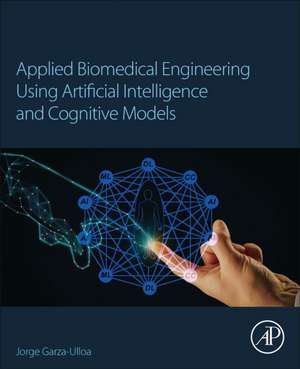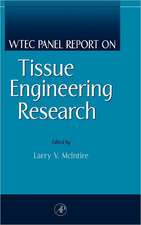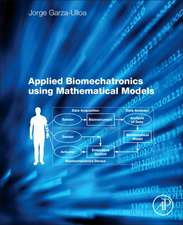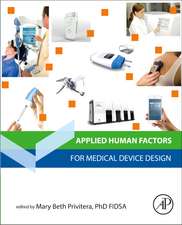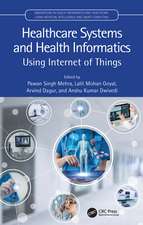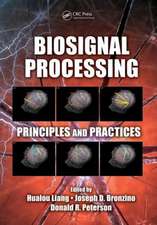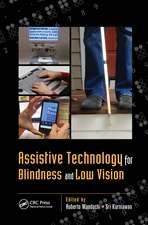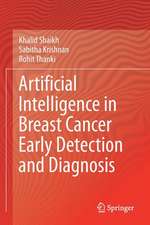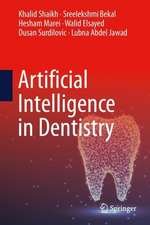Applied Biomedical Engineering Using Artificial Intelligence and Cognitive Models
Autor Jorge Garza Ulloaen Limba Engleză Paperback – 29 noi 2021
The interaction between these three areas are studied in this book with the objective of obtaining AI models on injuries and neurologic diseases of the human body, studying diseases of the brain, spine and the nerves that connect them with the musculoskeletal system. There are more than 600 diseases of the nervous system, including brain tumors, epilepsy, Parkinson's disease, stroke, and many others. These diseases affect the human cognitive system that sends orders from the central nervous system (CNS) through the peripheral nervous systems (PNS) to do tasks using the musculoskeletal system. These actions can be detected by many Bioinstruments (Biomedical Instruments) and cognitive device data, allowing us to apply AI using Machine Learning-Deep Learning-Cognitive Computing models through algorithms to analyze, detect, classify, and forecast the process of various illnesses, diseases, and injuries of the human body.
Applied Biomedical Engineering Using Artificial Intelligence and Cognitive Models provides readers with the study of injuries, illness, and neurological diseases of the human body through Artificial Intelligence using Machine Learning (ML), Deep Learning (DL) and Cognitive Computing (CC) models based on algorithms developed with MATLAB® and IBM Watson®.
- Provides an introduction to Cognitive science, cognitive computing and human cognitive relation to help in the solution of AI Biomedical engineering problems
- Explain different Artificial Intelligence (AI) including evolutionary algorithms to emulate natural evolution, reinforced learning, Artificial Neural Network (ANN) type and cognitive learning and to obtain many AI models for Biomedical Engineering problems
- Includes coverage of the evolution Artificial Intelligence through Machine Learning (ML), Deep Learning (DL), Cognitive Computing (CC) using MATLAB® as a programming language with many add-on MATLAB® toolboxes, and AI based commercial products cloud services as: IBM (Cognitive Computing, IBM Watson®, IBM Watson Studio®, IBM Watson Studio Visual Recognition®), and others
- Provides the necessary tools to accelerate obtaining results for the analysis of injuries, illness, and neurologic diseases that can be detected through the static, kinetics and kinematics, and natural body language data and medical imaging techniques applying AI using ML-DL-CC algorithms with the objective of obtaining appropriate conclusions to create solutions that improve the quality of life of patients
Preț: 972.57 lei
Preț vechi: 1207.73 lei
-19% Nou
Puncte Express: 1459
Preț estimativ în valută:
186.10€ • 194.83$ • 153.99£
186.10€ • 194.83$ • 153.99£
Carte tipărită la comandă
Livrare economică 31 martie-14 aprilie
Preluare comenzi: 021 569.72.76
Specificații
ISBN-13: 9780128207185
ISBN-10: 0128207183
Pagini: 704
Dimensiuni: 216 x 276 mm
Greutate: 1.6 kg
Editura: ELSEVIER SCIENCE
ISBN-10: 0128207183
Pagini: 704
Dimensiuni: 216 x 276 mm
Greutate: 1.6 kg
Editura: ELSEVIER SCIENCE
Cuprins
1. Biomedical Engineering and the evolution of Artificial Intelligence
2. Introduction to Cognitive science, cognitive computing and human cognitive relation to help in the solution of AI Biomedical engineering problems
3. Artificial Intelligence models applied to Biomedical Engineering
4. Machine learning models applied to Biomedical Engineering
5. Deep learning models applied to Biomedical Engineering
6. Cognitive Computing models applied to Biomedical Engineering
7. C AI-ML-DL-CC models applied to Biomedical Engineering
2. Introduction to Cognitive science, cognitive computing and human cognitive relation to help in the solution of AI Biomedical engineering problems
3. Artificial Intelligence models applied to Biomedical Engineering
4. Machine learning models applied to Biomedical Engineering
5. Deep learning models applied to Biomedical Engineering
6. Cognitive Computing models applied to Biomedical Engineering
7. C AI-ML-DL-CC models applied to Biomedical Engineering
